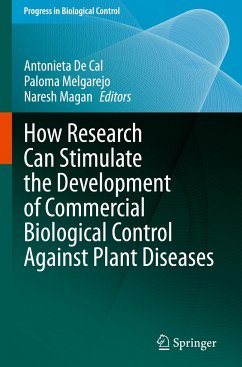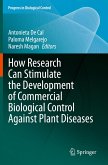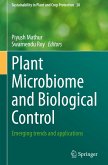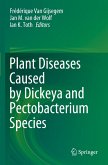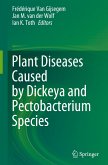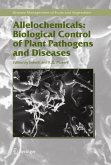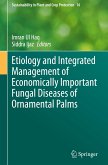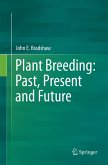How Research Can Stimulate the Development of Commercial Biological Control Against Plant Diseases
Herausgegeben:De Cal, Antonieta; Melgarejo, Paloma; Magan, Naresh
How Research Can Stimulate the Development of Commercial Biological Control Against Plant Diseases
Herausgegeben:De Cal, Antonieta; Melgarejo, Paloma; Magan, Naresh
- Gebundenes Buch
- Merkliste
- Auf die Merkliste
- Bewerten Bewerten
- Teilen
- Produkt teilen
- Produkterinnerung
- Produkterinnerung
Biological control has become an attractive alternative strategy for the control of plant diseases to reduce the excessive use of agrochemicals and its health hazards. But a significant gap still exists between basic research involving the discovery of a biocontrol agent and its development and implementation under commercial conditions. Because BCAs (unlike chemical a.m.) need to establish, colonize, survive and perform their metabolic activity to control diseases. In order to move a biocontrol agent from the laboratory to the market place requires many different disciplines and people with a…mehr
Andere Kunden interessierten sich auch für
![How Research Can Stimulate the Development of Commercial Biological Control Against Plant Diseases How Research Can Stimulate the Development of Commercial Biological Control Against Plant Diseases]() How Research Can Stimulate the Development of Commercial Biological Control Against Plant Diseases110,99 €
How Research Can Stimulate the Development of Commercial Biological Control Against Plant Diseases110,99 €![Plant Microbiome and Biological Control Plant Microbiome and Biological Control]() Plant Microbiome and Biological Control148,99 €
Plant Microbiome and Biological Control148,99 €![Plant Diseases Caused by Dickeya and Pectobacterium Species Plant Diseases Caused by Dickeya and Pectobacterium Species]() Plant Diseases Caused by Dickeya and Pectobacterium Species125,99 €
Plant Diseases Caused by Dickeya and Pectobacterium Species125,99 €![Plant Diseases Caused by Dickeya and Pectobacterium Species Plant Diseases Caused by Dickeya and Pectobacterium Species]() Plant Diseases Caused by Dickeya and Pectobacterium Species125,99 €
Plant Diseases Caused by Dickeya and Pectobacterium Species125,99 €![Allelochemicals: Biological Control of Plant Pathogens and Diseases Allelochemicals: Biological Control of Plant Pathogens and Diseases]() Allelochemicals: Biological Control of Plant Pathogens and Diseases110,99 €
Allelochemicals: Biological Control of Plant Pathogens and Diseases110,99 €![Etiology and Integrated Management of Economically Important Fungal Diseases of Ornamental Palms Etiology and Integrated Management of Economically Important Fungal Diseases of Ornamental Palms]() Etiology and Integrated Management of Economically Important Fungal Diseases of Ornamental Palms160,49 €
Etiology and Integrated Management of Economically Important Fungal Diseases of Ornamental Palms160,49 €![Plant Breeding: Past, Present and Future Plant Breeding: Past, Present and Future]() John E. BradshawPlant Breeding: Past, Present and Future148,99 €
John E. BradshawPlant Breeding: Past, Present and Future148,99 €-
-
-
Biological control has become an attractive alternative strategy for the control of plant diseases to reduce the excessive use of agrochemicals and its health hazards. But a significant gap still exists between basic research involving the discovery of a biocontrol agent and its development and implementation under commercial conditions. Because BCAs (unlike chemical a.m.) need to establish, colonize, survive and perform their metabolic activity to control diseases. In order to move a biocontrol agent from the laboratory to the market place requires many different disciplines and people with a variety of expertise. Research can stimulate the development of commercial biocontrol agents.
Chapter 16 is available open access under a Creative Commons Attribution 4.0 International License via link.springer.com.
Chapter 16 is available open access under a Creative Commons Attribution 4.0 International License via link.springer.com.
Produktdetails
- Produktdetails
- Progress in Biological Control 21
- Verlag: Springer / Springer International Publishing / Springer, Berlin
- Artikelnr. des Verlages: 978-3-030-53237-6
- 1st ed. 2020
- Seitenzahl: 356
- Erscheinungstermin: 10. Januar 2022
- Englisch
- Abmessung: 241mm x 160mm x 25mm
- Gewicht: 707g
- ISBN-13: 9783030532376
- ISBN-10: 3030532372
- Artikelnr.: 59588577
- Herstellerkennzeichnung Die Herstellerinformationen sind derzeit nicht verfügbar.
- Progress in Biological Control 21
- Verlag: Springer / Springer International Publishing / Springer, Berlin
- Artikelnr. des Verlages: 978-3-030-53237-6
- 1st ed. 2020
- Seitenzahl: 356
- Erscheinungstermin: 10. Januar 2022
- Englisch
- Abmessung: 241mm x 160mm x 25mm
- Gewicht: 707g
- ISBN-13: 9783030532376
- ISBN-10: 3030532372
- Artikelnr.: 59588577
- Herstellerkennzeichnung Die Herstellerinformationen sind derzeit nicht verfügbar.
Prof. Antonieta De Cal Responsible of Fungal Plant Pathogen Unit, Plant Protection Department, Instituto Nacional de Investigación y Tecnología Agraria y Alimentaria (INIA). Carretera de La Coruña km 7, 28040 Madrid, Spain. Email: cal@inia.es Prof. De Cal completed her BSc Hons (Science) and Master Agricultural Engineering, College of Agriculture, Polytechnic University of Madrid (1979-1984), and her PhD Plant Pathology in 1989 (Polytechnic University of Madrid). In 1991, she was staff scientific researcher focused on plant pathology objectives, where epidemiology and biological control of diseases were her main topics with the management of budgets and human resources. In 2013 she was Head of Plant Protection Department which has a main objective of protecting crops from microbial pathogens. Prof. De Cal is practically responsible for the Fungal Plant Pathogen Unit where the etiology, epidemiology and control of diseases caused by phytopathogenic fungi of fruit and vegetables are investigated. Her focus in biocontrol is on resilience and production/formulation of microorganisms for disease control and the study of environmental effects on the ecosystem; the study of the tritrophic agent interactions of biocontrol-host-pathogen through the use of -omics tools and fluorescence and confocal microscopy; and the development of alternative methods (integration of natural substances - biocontrol agents) for the sustainable control of diseases. She has published widely in these research areas with 85+ peer-reviewed Journal papers, written 40+ Book Chapters and edited a book about Biological Control of Plant Diseases (2017) PHYTOMA-ESPAÑA SL. 249 pp. Paloma Melgarejo received a degree in Agricultural Engineering at the Polytechnic University of Madrid, and a PhD in Plant Pathology at the same university. Currently she is Research Professor at the Spanish Ministry of Agriculture, Food and Fish, and is working at INRAE (Paris, France) as Scientific Officer in the Executive Secretariat of the "Initiative 4p1000 Soils for Food Security and Climate". Previously, Paloma Melgarejo has been Deputy Director of Prospective and Program Coordination of INIA (Spain) as project owner of the National Agricultural Research program (RTA) from 2008 until 2017. She was also the scientific manager for the National Agricultural Research Program (AGR) and the National Forestry Research Program (FOR) in the Ministry of Science and Innovation from 2003 until 2008. As scientist, her area of research is Plant Pathology, where epidemiology and biological control of diseases were her main topics. She has published more than 100 scientific refereed papers and several books. She has coordinated more than 25 competitive funding projects, participating in over 25 more. She has been Associate Professor at the Department of Biotechnology of the Agronomic Engineers Technical College of The Polytechnic University of Madrid for more than 20 years. Paloma Melgarejo has been the SCAR Spanish Delegate from January 2008 until September 2017, participating in the Steering Committee and in several Collaborative and Strategic Working Groups of SCAR. She has been the delegate from Spain to the FACCE JPI Governing Board since the beginning until the end of 2017, and currently she is a member of the Scientific Advisory Board. She is also a member of the Steering Commitee of EUPHRESCO Network Prof. Naresh Magan Head, Applied Mycology Group, Environment and AgriFood Theme, Cranfield University, Cranfield, Beds. MK43 0AL, U.K. Email: n.magan@cranfield.ac.uk Prof. Magan completed his BSc Hons (Botany) and MSc Plant Pathology at Exeter University U.K. (1973-1977) and his PhD in 1982 (Rothamsted Research, external student Reading University). In 2013, he was awarded a D.Sc by Cranfield for his research contributions in ecophysiology of fungi. He holds the Chair in Applied Mycology at Cranfield University. He has carried out research on fungal pathogens/mycotoxigenic fungi and their control in the context of the food security/safety agenda for 35+ years. His current research includes molecular ecology/ecophysiology of mycotoxigenic fungi and fungal pathogens in food production systems including biocontrol and integrated prevention strategies. His focus in biocontrol is on resilience and production/formulation of microorganisms for both pest/pathogen control especially related to existing and future climate change-related scenarios. He has published widely in these research areas with 300+ peer-reviewed Journal papers, written 30+ Book Chapters and edited a number of Books.
Part I The Pre-Critical System.- Chapter 1.Part I The Pre-Critical System.- Chapter 2.Kant's Analytic Method.- Part II The Critical Turn.- Chapter 3.The Collapse of the Pre-Critical Cosmology.- Chapter 4.A Closer Look at the Critical Turn.- Part III Critical Cosmology.- Chapter 5. The Antinomy of Pure Reason.- Chapter 6. Cosmology and Transcendental Idealism.- Part IV Appendix.- Index.
Part I The Pre-Critical System.- Chapter 1.Part I The Pre-Critical System.- Chapter 2.Kant's Analytic Method.- Part II The Critical Turn.- Chapter 3.The Collapse of the Pre-Critical Cosmology.- Chapter 4.A Closer Look at the Critical Turn.- Part III Critical Cosmology.- Chapter 5. The Antinomy of Pure Reason.- Chapter 6. Cosmology and Transcendental Idealism.- Part IV Appendix.- Index.

